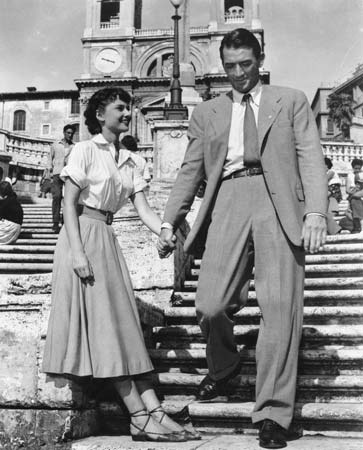Peck, Gregory
American actor
in full Eldred Gregory Peck
born April 5, 1916, La Jolla, California, U.S.
died June 12, 2003, Los Angeles, California
tall, imposing American actor with a deep, mellow voice, best known for conveying characters of honesty and integrity.
A pharmacist's son, Peck attended military school and San Diego State College before enrolling as a premed student at the University of California at Berkeley. There he developed a taste for acting, and upon graduation he headed to New York, where he studied at the Neighborhood Playhouse and supported himself as an usher at Radio City Music Hall and as a concession barker at the 1939 World's Fair. He made his Broadway debut in The Morning Star (1942), the first of three consecutive flops in which he appeared, although critics liked Peck's performances.
Invited to Hollywood, Peck made his first film appearance as a Russian guerrilla fighter in Days of Glory (1944). Because of an earlier spinal injury, he was unable to serve in World War II. This circumstance enabled him to emerge as one of the most popular leading men of the 1940s. He earned his first Academy Award nomination for his performance as an idealistic missionary priest in The Keys of the Kingdom (1944), and three years later he received a second Oscar nomination for his interpretation of a journalist who poses as a Jew in order to expose anti-Semitism in Gentleman's Agreement (1947). Peck's other notable films from this decade include The Valley of Decision (1945), Alfred Hitchcock (Hitchcock, Sir Alfred)'s Spellbound (1945), Duel in the Sun (1946), The Yearling (1946), and Yellow Sky (1948).

 Although Peck worked with most of the major Hollywood directors of the day, including Hitchcock, King Vidor (Vidor, King), William Wellman (Wellman, William), William Wyler (Wyler, William), Vincente Minnelli (Minnelli, Vincente), and Lewis Milestone, he did some of his finest work for Henry King (King, Henry). In King's Twelve O'Clock High (1949), The Gunfighter (1950), David and Bathsheba (1951), The Snows of Kilimanjaro (1952), The Bravados (1958), and Beloved Infidel (1959), Peck portrayed outwardly strong and authoritative individuals whose inner demons and character flaws threaten to destroy them. He was finally honoured with an Academy Award for his performance as the ethical and compassionate Alabama lawyer Atticus Finch in the screen adaptation of Harper Lee (Lee, Harper)'s To Kill a Mockingbird (1962). His subsequent screen roles included an anguished father in the popular horror film The Omen (1976), the titular American general in MacArthur (1977), and a rare villainous turn as Nazi doctor Josef Mengele (Mengele, Josef) in The Boys from Brazil (1978). Although Peck continued to work into the early 1990s (at which time he announced that he was largely retired), his final films are mostly forgettable.
Although Peck worked with most of the major Hollywood directors of the day, including Hitchcock, King Vidor (Vidor, King), William Wellman (Wellman, William), William Wyler (Wyler, William), Vincente Minnelli (Minnelli, Vincente), and Lewis Milestone, he did some of his finest work for Henry King (King, Henry). In King's Twelve O'Clock High (1949), The Gunfighter (1950), David and Bathsheba (1951), The Snows of Kilimanjaro (1952), The Bravados (1958), and Beloved Infidel (1959), Peck portrayed outwardly strong and authoritative individuals whose inner demons and character flaws threaten to destroy them. He was finally honoured with an Academy Award for his performance as the ethical and compassionate Alabama lawyer Atticus Finch in the screen adaptation of Harper Lee (Lee, Harper)'s To Kill a Mockingbird (1962). His subsequent screen roles included an anguished father in the popular horror film The Omen (1976), the titular American general in MacArthur (1977), and a rare villainous turn as Nazi doctor Josef Mengele (Mengele, Josef) in The Boys from Brazil (1978). Although Peck continued to work into the early 1990s (at which time he announced that he was largely retired), his final films are mostly forgettable.Throughout his career, Peck received the most praise for his portrayals of stoical men motivated by a quest for decency and justice; he was less successful in performances demanding a broad emotional range, such as his interpretation of Captain Ahab in Moby Dick (1956), in which critics felt he failed to convey the compulsive qualities of one of American literature's most complex characters. Nevertheless, he was an ingratiating performer, fully capable in roles that required him to be the moral centre of a film. Peck was also widely admired and respected as one of the motion picture industry's most cooperative and least egotistical stars. Outside of his film work, he was tirelessly active in civic, charitable, and political causes. He served as chairman of the American Cancer Society and of the trustee board of the American Film Institute (which he cofounded), and for three years he was president of the Academy of Motion Picture Arts and Sciences.
Additional Reading
Michael Freedland, Gregory Peck: A Biography (1980); John Griggs, The Films of Gregory Peck (1984, reissued 1988).
- Igor Vasilyevich Kurchatov
- Igor Yevgenyevich Tamm
- Iguala
- Iguala Plan
- iguana
- iguanid
- Iguanodon
- Iguaçu Falls
- Iguaçu River
- Iguvine Tables
- Ihara Saikaku
- Ihimaera, Witi
- ihram
- II Alexander, James Waddell
- Ii blood group system
- II Chippendale, Thomas
- II Ferrabosco, Alfonso
- II Ford, Henry
- II Hammerstein, Oscar
- III Adams, Charles Francis
- III Baker, James Addison
- III Bremer, L. Paul
- III Dean, John Wesley
- III Elder, Lonne
- III Rockefeller, John D.